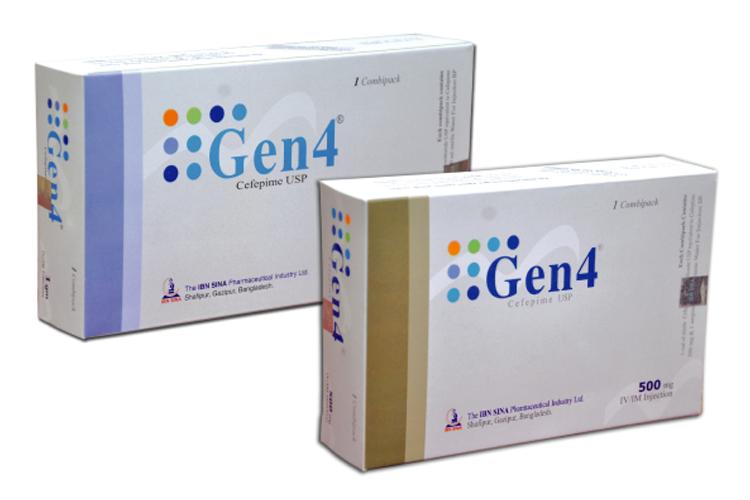
GEN 4
CEFEPIME HYDROCHLORIDE USP
| NAME | STRENGTH | PACK SIZE | DOSAGE FORM |
|---|---|---|---|
| GEN 4 1 MG | 1 MG | 1 S | INJECTION |
| GEN 4 500 MG | 500 MG | 1 S | INJECTION |
Gen4 - 500 mg IV/IM injection: Each vial contains Cefepime 500 mg (As sterile Cefepime HCl USP with L- Arginine). Gen4-1g IV/IM injection: Each vial contains Cefepime 1g (As sterile Cefepime HCl USP with L- Arginine).
Gen4 (Cefepime) is a fourth generation Cephalosporin antibiotic, having extended spectrum activity against gm (+) and gm (-) microbes as compares to third generation and additionally Cefepime may eradicate pathogens resistant to other Cephalosporin. Cefepime is a bactericidal agent that acts by inhibition of bacterial cell wall synthesis. Within the bacterial cells, the molecular targets of Cefepime are the penicillin binding proteins (PBPs). The chemical structure of Cefepime allows it to bind to penicillin binding proteins and to penetrate through outer membrane of Gm (-) bacteria more rapidly than most Cephalosporin. Cefepime is also more stable to beta-lactamase hydrolysis, making for an enhanced resistance pattern, especially with Gm (-) bacteria.
In moderate to severe pneumonia, in mild to moderate uncomplicated/complicated urinary tract infection, in severe uncomplicated/complicated urinary tract infectio, in moderate to severe uncomplicated skin and skin structure infections, in complicated intra-abdominal infections
Adult dosage: Recommended dosage schedule for normal renal function - in moderate to severe pneumonia: 1-2g IV 12 hourly for 10 days; in empiric therapy for febrile neutropenic patients: 2g IV 8 hourly for 7 days; in mild to moderate uncomplicated/complicated urinary tract infection: 0.5 - 1g IV/IM 12 hourly for 7-10 days; in severe uncomplicated/complicated urinary tract infection: 2g IV, 12 hourly for 10 days, in moderate to severe uncomplicated skin and skin structure infections: 2g IV 12 hourly for 10 days; in complicated intra-abdominal infection: 2g IV (with Metronidazole) - 12 hourly for 7-10 days, Paediatric dosage: 50 mg /kg/dose 12 hourly (in neutropenic 8 hourly). Paediatric dose should not exceed that recommended for adults. Impaired hepatic function- No dose adjustment is necessary for patients with impaired hepatic function.
Cefepime is contraindicated in patients who have shown hypersensitive reaction to Cefepime or other Cephalosporin, Penicillins or other beta-Lactam antibiotics.
Cefepime should be prescribed with caution in individuals with a history of gastrointestinal particularly colitis. In patients with impaired renal function the dose of Cefepime should be adjusted. In pregnancy: Since, no adequate and well controlled studies of Cefepime use in pregnancy, so this drug should be used in pregnancy only if clearly needed. Paediatric use: It may be given over 2 month old aged child. Geriatric use: Older patients having renal insufficiency dosage and administration of Cefepime should be adjusted.
Rash, diarrhoea, nausea, vomiting, pruritis, fever and headache. Hypocalemia is more common among elderly patients. Serious adverse events including encephalopathy, myoclonus seizures and or renal failure have been reported in patients with renal impairment.
No adequate and well-controlled studies of Cefepime use in pregnant women. So this drug should be used during pregnancy only if clearly needed.Cefepime is excreted in human breast milk in very low concentrations (0.5 mcg/ml). Caution should be exercised when Cefepime is administered to a nursing woman.
Aminoglycoside: Renal function should be monitored carefully if high doses of aminoglycosides are to be administered with Cefepime because of the increased potential of nephrotoxicity and ototoxicity of aminoglycoside antibiotics.
Furosemide: Nephrotoxicity has been reported following concomitant administration of other cephalosporins with potent diuretics such as furosemide.
Probenecid: High dose probenecid decreases clearance and increases
effect of Cefepime.
Accidental overdosing might occur if large doses are given to patients with reduced renal function. In clinical trials, Cefepime over dosage occurred in a patient with renal failure (creatinine clearance <11 ml /min) who received 2 g 24 hourly for 7 days. The patient exhibited seizures, encephalopathy and neuromuscular excitability. Patients who receive an overdose should be carefully observed and given supportive treatment. In the presence of renal insufficiency, hemodialysis, not peritoneal dialysis, is recommended to aid in the removal of Cefepime from the body.
The recommended maximum storage temperature is 25°C.
Gen4-500 mg IV/IM injection: Each vial contains Cefepime 500 mg (As sterile Cefepime HCl USP with L- Arginine) and a 5 ml ampoule sterile WFI for reconstitution in a combipack. Gen4-1g IV/IM injection: Each vial contains Cefepime 1g (As sterile Cefepime HCl USP with L- Arginine) and a 10 ml ampoule sterile WFI for reconstitution in a combipack.
